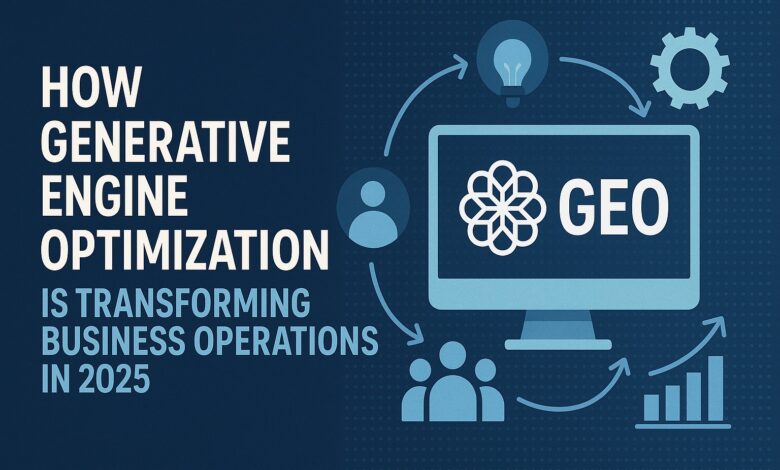How Generative Engine Optimization is Transforming Business Operations in 2025

The business world is undergoing a radical transformation, fueled by the innovative power of generative technologies. In particular, the rise of Generative Engine Optimization (GEO) is emerging as a game-changer, reshaping how companies operate, make decisions, and engage with customers. This technology leverages the power of AI-driven algorithms to optimize a wide range of business processes, from product development to marketing and customer service. In 2025, businesses that harness GEO stand poised to streamline their operations, enhance efficiency, and offer personalized experiences that were once thought impossible.
The Rise of Generative Engine Optimization
Generative Engine Optimization is not just another buzzword in the tech world—it’s a groundbreaking approach that has the potential to completely transform the business landscape. It involves the use of advanced AI models that generate content, solutions, and recommendations based on vast datasets, learning patterns, and user behavior. Through continuous data input and feedback, these engines can fine-tune operations, automate processes, and deliver results with remarkable speed and accuracy.
The technology is rooted in machine learning and artificial intelligence (AI), two areas that have made great strides in the past few years. Generative engines can analyze patterns from historical data, predict trends, and even generate entirely new ideas, all of which help businesses remain competitive in an increasingly complex and fast-paced world.
As the world advances in 2025, the potential applications of generative engine optimization are vast and multifaceted. From automating mundane tasks to supporting complex decision-making, this innovative technology promises to bring operational efficiency, strategic insights, and enhanced customer experiences to the forefront of business operations.
How Generative Engine Optimization is Transforming Operations
Generative Engine Optimization is transforming business operations in various ways. At its core, GEO is about using AI to enhance decision-making processes, drive automation, and optimize workflows. By analyzing large datasets, GEO can identify inefficiencies, highlight potential opportunities, and generate solutions that might not be immediately obvious to human decision-makers. This level of data-driven optimization helps businesses operate with greater precision, minimize costs, and stay ahead of competitors.
One of the most significant impacts of generative engine optimization is on product development. In the traditional model, businesses relied heavily on market research, customer feedback, and internal teams to design and launch new products. While this approach still has value, it can be time-consuming and costly. GEO can speed up this process by automating product design and development, predicting market trends, and even generating entirely new concepts that align with consumer preferences. By tapping into real-time data, businesses can reduce the time it takes to bring a product to market, increase product relevance, and enhance customer satisfaction.
In addition to product development, GEO is also transforming how businesses manage supply chains. Optimizing supply chain operations has always been a complex challenge, requiring businesses to balance costs, inventory levels, and demand forecasting. Generative engine optimization offers a powerful solution by using predictive analytics and data modeling to automate and streamline supply chain management. GEO can analyze historical sales data, predict future demand, and automatically adjust inventory levels to ensure products are available when customers need them, without overstocking or understocking.
Enhancing Customer Experience and Personalization
Another significant benefit of generative engine optimization is its ability to enhance customer experience and personalization. In 2025, consumers expect more than just a product or service—they want personalized experiences that cater to their individual needs and preferences. By leveraging GEO, businesses can offer highly tailored experiences that resonate with customers, driving engagement, loyalty, and ultimately, revenue.
Generative engines analyze vast amounts of data, including purchasing history, browsing behavior, and social media activity, to gain insights into customer preferences. These insights allow businesses to create personalized offers, content, and recommendations that are aligned with individual tastes. Whether it’s suggesting products that a customer is likely to buy next, offering discounts on items they’ve shown interest in, or customizing advertisements based on their browsing history, GEO can significantly improve the customer experience by making it more relevant and engaging.
Moreover, GEO can also optimize customer support and service operations. By using AI-driven chatbots and virtual assistants, businesses can offer 24/7 customer support, handle routine inquiries, and resolve issues more efficiently. These virtual agents are powered by generative models that can analyze customer queries in real-time and provide accurate, contextually relevant responses. The result is faster service, greater customer satisfaction, and a reduced burden on human support teams.
Optimizing Marketing and Sales
Marketing and sales teams can also benefit significantly from generative engine optimization. In the world of digital marketing, personalization is key to capturing the attention of potential customers. GEO can enhance marketing efforts by generating targeted content, optimizing campaigns, and improving conversion rates. By analyzing user behavior, search patterns, and social media trends, generative engines can identify the most effective messaging strategies and recommend adjustments to ongoing campaigns.
GEO also has a profound impact on sales strategies. By automating lead generation, scoring, and nurturing, businesses can focus their efforts on high-potential leads, reducing wasted time and resources. Generative engines can analyze vast datasets to predict which leads are most likely to convert, based on historical data and customer behavior. This data-driven approach enables sales teams to work smarter, not harder, increasing productivity and driving revenue growth.
The Future of Work: Automation and Employee Empowerment
Generative Engine Optimization is not only transforming how businesses interact with customers, but also how they operate internally. By automating routine tasks, such as data entry, report generation, and scheduling, businesses can free up employees to focus on higher-level, more strategic activities. This shift toward automation is enabling companies to optimize their workforce, improve job satisfaction, and increase productivity.
In 2025, we’re likely to see even more industries embracing generative engines to automate tasks and improve internal workflows. For example, human resources departments can leverage GEO to streamline recruitment by automatically screening resumes, matching candidates with job descriptions, and even conducting preliminary interviews. Similarly, legal and compliance teams can use generative engines to review contracts, analyze legal documents, and identify potential risks, all while minimizing human error.
However, it’s important to note that automation doesn’t mean job displacement. Rather, it empowers employees to focus on higher-value tasks that require creativity, critical thinking, and emotional intelligence. The combination of automation and human expertise is a powerful formula for success, allowing businesses to operate more efficiently while enhancing employee satisfaction and innovation.
Ethical Considerations and the Role of Governance
As with any emerging technology, the rise of generative engine optimization raises ethical considerations that businesses must address. The automation of decision-making processes, especially in areas like hiring, customer service, and financial analysis, requires careful oversight to ensure fairness, transparency, and accountability.
In 2025, businesses will need to adopt responsible AI governance frameworks that prioritize ethical standards and mitigate potential risks associated with algorithmic bias, data privacy, and security. By ensuring that their generative engines are programmed with ethical guidelines, businesses can minimize the negative impact of automation on society and foster trust with consumers, employees, and stakeholders.
Conclusion
Generative Engine Optimization is reshaping the business world by enabling companies to operate more efficiently, deliver personalized experiences, and remain agile in an ever-changing landscape. From optimizing product development and supply chain management to enhancing customer experiences and streamlining internal operations, GEO holds the potential to revolutionize virtually every aspect of business operations. As we look toward 2025, businesses that embrace this technology will be better positioned to thrive in an increasingly competitive and complex global marketplace.
To stay ahead of the curve and take full advantage of Generative Engine Optimization, companies should consider integrating advanced GEO solutions into their operations, helping them unlock new opportunities and create value for their customers and stakeholders. For more information on how GEO can transform your business, visit https://geocentrix.ai/.


